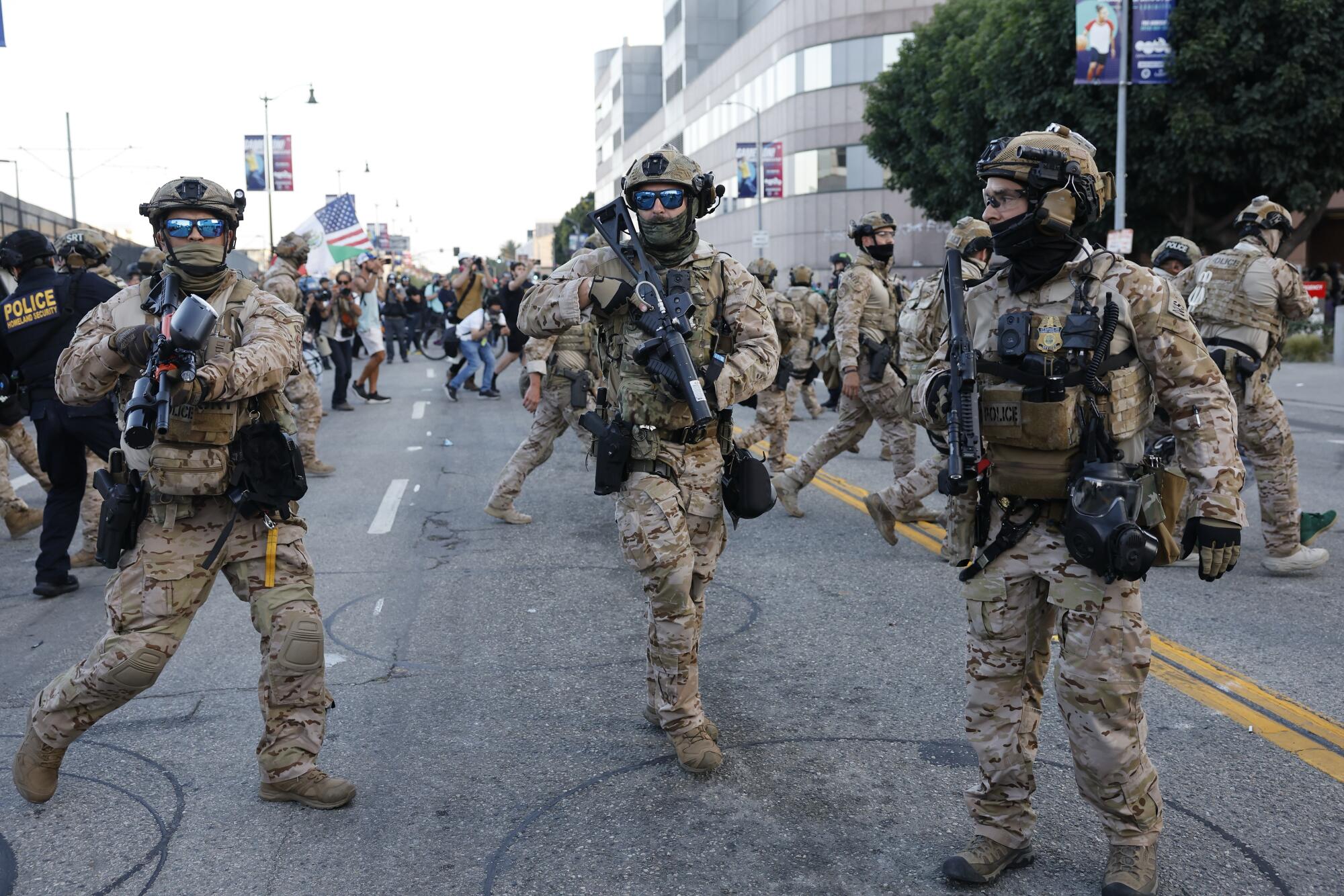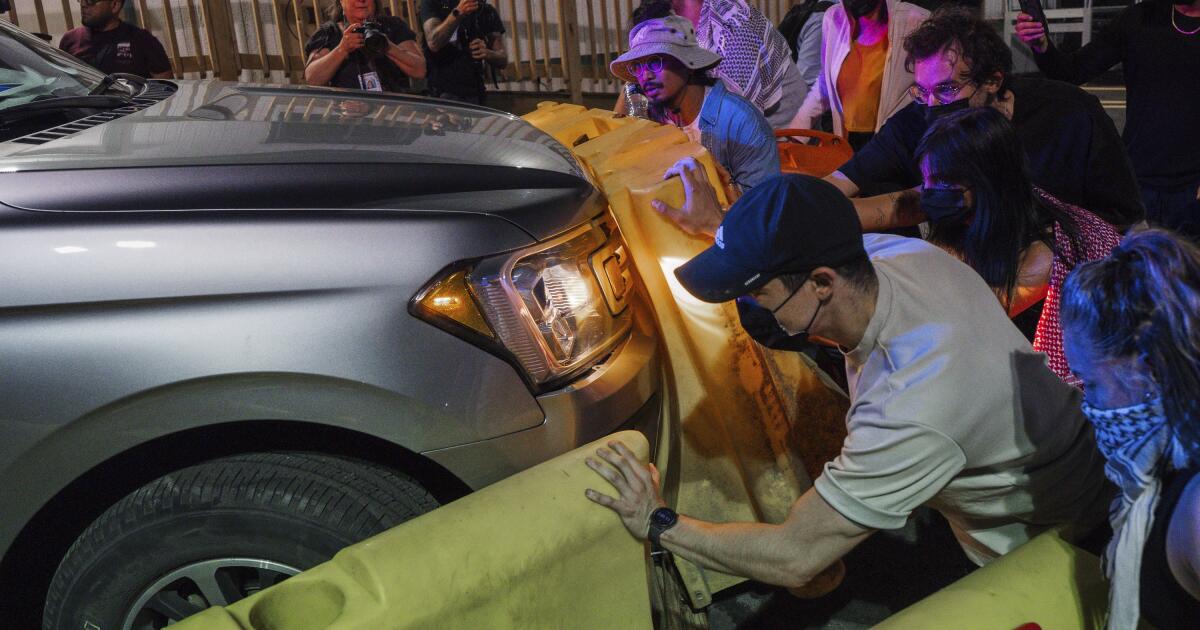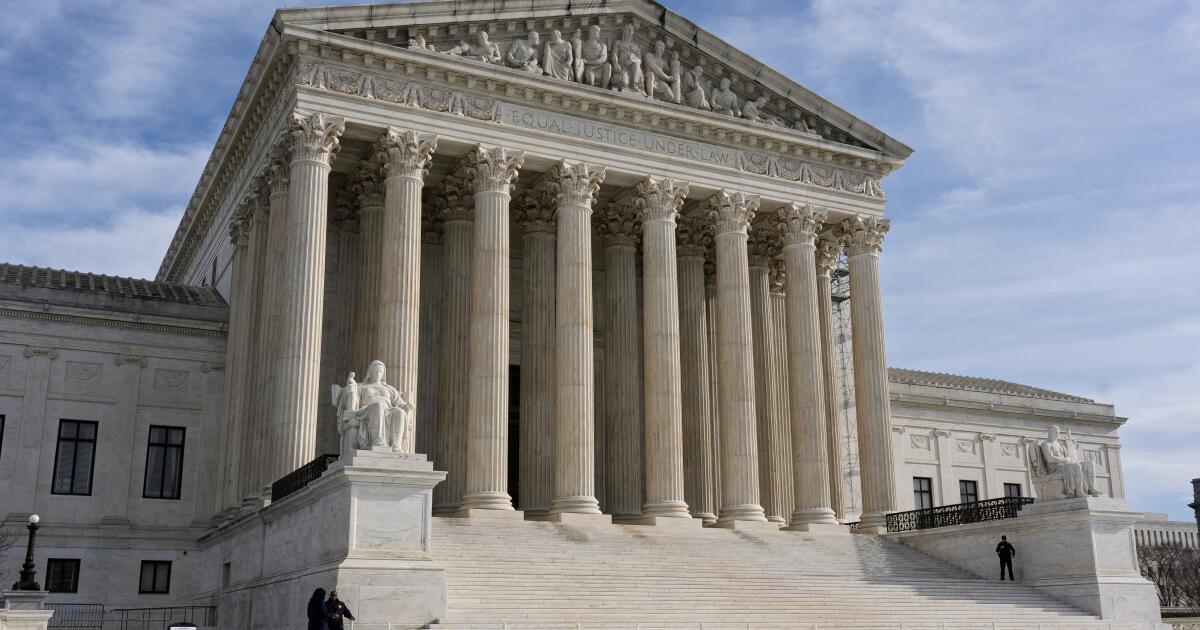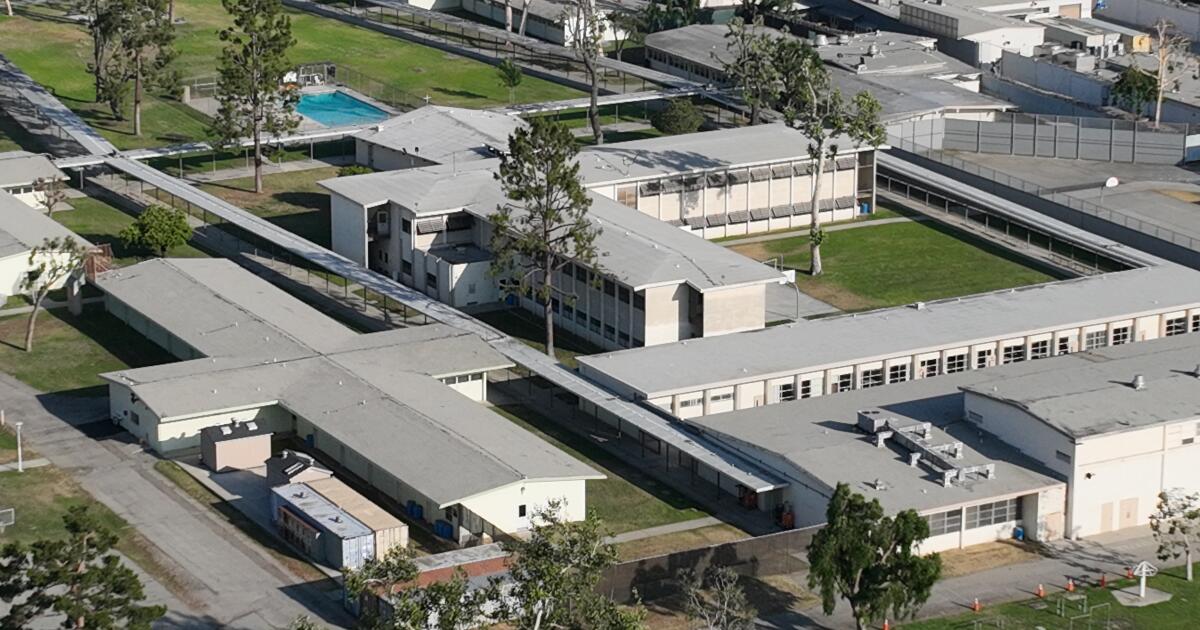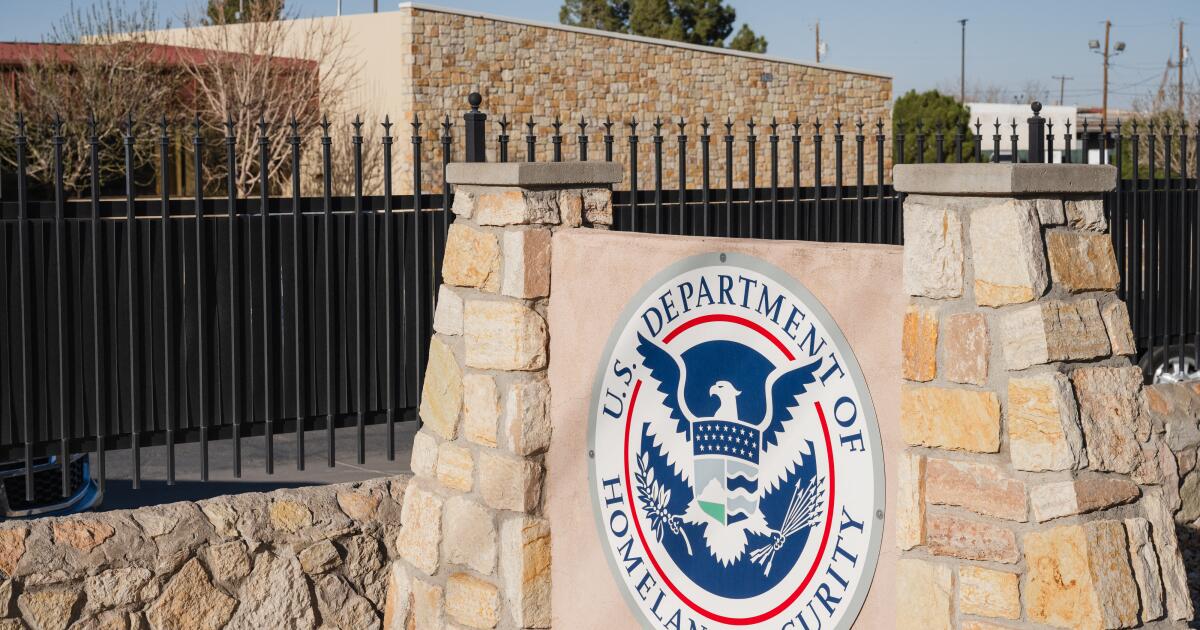ICE issued new rules for Congress members visiting detention centers. Experts say they’re illegal
WASHINGTON — The day after immigration raids began in Los Angeles, Rep. Norma Torres (D-Pomona) and three other members of Congress were denied entry to the immigrant detention facility inside the Roybal Federal Building.
The lawmakers were attempting an unannounced inspection, a common and long-standing practice under congressional oversight powers.
Immigration and Customs Enforcement officials said too many protesters were present on June 7 and officers deployed chemical agents multiple times. In a letter later to acting ICE Director Todd Lyons, Torres said she ended up in the emergency room for respiratory treatment. She also said the protest had been small and peaceful.
Torres is one of many Democratic members of Congress, from states including California, New York and Illinois, who have been denied entry to immigrant detention facilities in recent weeks.
Jim Townsend, director of the Carl Levin Center for Oversight and Democracy at Wayne State University in Michigan, said the denials mark a profound — and illegal — shift from past practice.
“Denying members of Congress access to facilities is a direct assault on our system of checks and balances,” he said. “What members of Congress are trying to do now is to be part of a proud bipartisan tradition of what we like to call oversight by showing up.”
Subsequent attempts by lawmakers to inspect the facility inside the Roybal Building have also been unsuccessful.
Rep. Jimmy Gomez (D-Los Angeles), who was with Torres the day she was hospitalized, went back twice more — on June 9 and on Tuesday — and was rebuffed. Torres and Rep. Judy Chu (D-Monterey Park) tried at separate times Wednesday and were both denied.
Gomez and other Democrats have pointed to a federal statute, detailed in yearly appropriations packages since 2020, which states that funds may not be used to prevent a member of Congress “from entering, for the purpose of conducting oversight, any facility operated by or for the Department of Homeland Security used to detain or otherwise house aliens …”
The statute also states that nothing in that section “may be construed to require a Member of Congress to provide prior notice of the intent to enter a facility” for the purpose of conducting oversight. Under the statute, federal officials may require at least 24 hours notice for a visit by congressional staff — but not members themselves.
Under ICE guidelines published this month for members of Congress and their staff, the agency requests at least 72 hours notice from lawmakers and requires at least 24 hours notice from staff.
The agency says it has discretion to deny or reschedule a visit if an emergency arises or the safety of the facility is jeopardized, though such contingencies are not mentioned in the law.
Gomez said an ICE official called him Tuesday to say that oversight law doesn’t apply to the downtown L.A. facility because it is a field office, not a detention facility.
“Well it does say Metropolitan Detention Center right here in big, bold letters,” he says in a video posted afterward on social media, gesturing toward a sign outside the building. “But they say this is a processing center. So I smell bull—.”
Department of Homeland Security police patrol the street after detaining a protester at the Edward R. Roybal Federal Building in downtown L.A. on June 12.
(Gina Ferazzi / Los Angeles Times)
If no one is technically being detained, Gomez said he rhetorically asked the official during their call, are they free to leave?
Torres visited the facility in February by setting up an appointment, her staff said. She got another appointment for last Saturday, but ICE canceled it because of the protests. When members emailed ICE to set up a new appointment, they got no response.
Gomez said he believes ICE doesn’t want lawmakers to see field offices because of poor conditions and lack of attorney access because of ramped-up arrests that have reportedly left some detainees there overnight without beds and limited food.
In some cases, lawmakers have had success showing up unannounced. On Friday, Rep. Pete Aguilar (D-Redlands) toured the Adelanto ICE Processing Facility, north of San Bernardino. After being denied entry to the Adelanto Facility on June 8, Chu and four other California Democrats were allowed in on Tuesday.
“Just because ICE has opened their doors to a few members of Congress does not excuse their inflammatory tactics to meet deportation quotas,” said Rep. Mark Takano (D-Riverside), who visited Adelanto with Chu. “Accountability means showing a consistent pattern of accessibility, not just a one-off event.”
The representatives learned the facility is now at full capacity with 1,100 detainees, up from 300 a month ago. Chu said they spoke to detainees from the L.A. raids, who she said were not criminals and who are now living in inhumane conditions — without enough food, unable to change their underwear for 10 days or to call their families and lawyers.
Chu said the group arrived early and stood in the lobby to avoid a repeat of their previous attempt, when facility guards kept them off the property by locking a fence.
Tom Homan, President Trump’s border policy advisor, departs a meeting with Republican senators who are working to cancel $9.4 billion in spending already approved by Congress at the Capitol in Washington on June 11.
(J. Scott Applewhite / Associated Press)
In an interview with The Times this month, Trump’s chief border policy advisor Tom Homan said members of Congress are welcome to conduct oversight, but that they must contact the facility first to make arrangements. The agency has to look after the safety and security of the facility, officers and detainees, he said.
“Please go in and look at them,” he said. “They’re the best facilities that money can buy, the highest detention standards in the industry. But there’s a right way and wrong way to do it.”
Tricia McLaughlin, assistant secretary for Homeland Security, said in a statement to The Times that requests for visits are needed because “ICE law enforcement have seen a surge in assaults, disruptions and obstructions to enforcement, including by politicians themselves.”
She added that requests for visits should be made with enough time — “a week is sufficient” — to not interfere with the president’s authority under Article II of the Constitution to oversee executive branch functions.
DHS Assistant Secretary for Public Affairs Tricia McLaughlin, flanked by Deputy Director of Immigration and Customs Enforcement Madison Sheahan, left, and acting Director of ICE Todd Lyons, speaks during a news conference in Washington on May 21.
(Jose Luis Magana / Associated Press)
Rep. Bennie Thompson (D-Miss.), ranking member of the House Homeland Security Committee, slammed the guidance Wednesday on X.
“This unlawful policy is a smokescreen to deny Member visits to ICE offices across the country, which are holding migrants — and sometimes even U.S. citizens — for days at a time,” he wrote. “They are therefore facilities and are subject to oversight and inspection at any time. DHS pretending otherwise is simply their latest lie.”
Townsend, the congressional oversight expert, said the practice goes back to when President Truman was a senator and established a committee to investigate problems among contractors who were supplying the World War II effort.
“That committee conducted hundreds of field visits, and they would show up unannounced in many instances,” Townsend said.
More recently, Sen. Chuck Grassley (R-Iowa) drove to the Pentagon in 1983 and demanded access to ask questions about overspending after being stonewalled, he said, by Department of Defense officials.
The Supreme Court has interpreted the Constitution to mean that Congress has wide authority to conduct oversight to show up unannounced in order to secure accurate information, Townsend said.
National Guard members stand at post at the Edward R. Roybal Federal Building in Los Angeles on June 10.
(Myung J. Chun / Los Angeles Times)
Sen. Alex Padilla (D-Calif.) said the Trump administration is trying to hide the truth from the public. Last week, Padilla was shoved out of a news conference, forced to the ground and handcuffed after attempting to question Homeland Security Secretary Kristi Noem.
“The Trump administration has done everything in their power but to provide transparency to the American people about their mission in Los Angeles,” he said during an impassioned floor speech Wednesday in which he cried recounting the ordeal.
In an interview Wednesday with Newsmax, McLaughlin accused Democratic lawmakers of using oversight as an excuse to stage publicity stunts.
“The Democrats are reeling,” she said. “They have no actual message and so they’re doing this to get more attention and to manufacture viral moments.”
On Tuesday, Gomez wore a suit jacket with his congressional lapel pin and carried his congressional ID card and business card in his hand — “so there would be no mistake” as to who he was. He said he was concerned that what happened to Padilla could also happen to him. He was denied access anyway.
Gomez said federal officials should be fined each time they deny oversight access to members of Congress. He said he and other members are also discussing whether to file a lawsuit to compel access.
“When you have an administration that is operating outside the bounds of the law, they’re basically saying, ‘What recourse do you have? Can you force us? You don’t have an army. We don’t need to listen to you,’” Gomez said. “Then you have to put some real teeth into it.”
Times staff writer Nathan Solis in Los Angeles contributed to this report.
